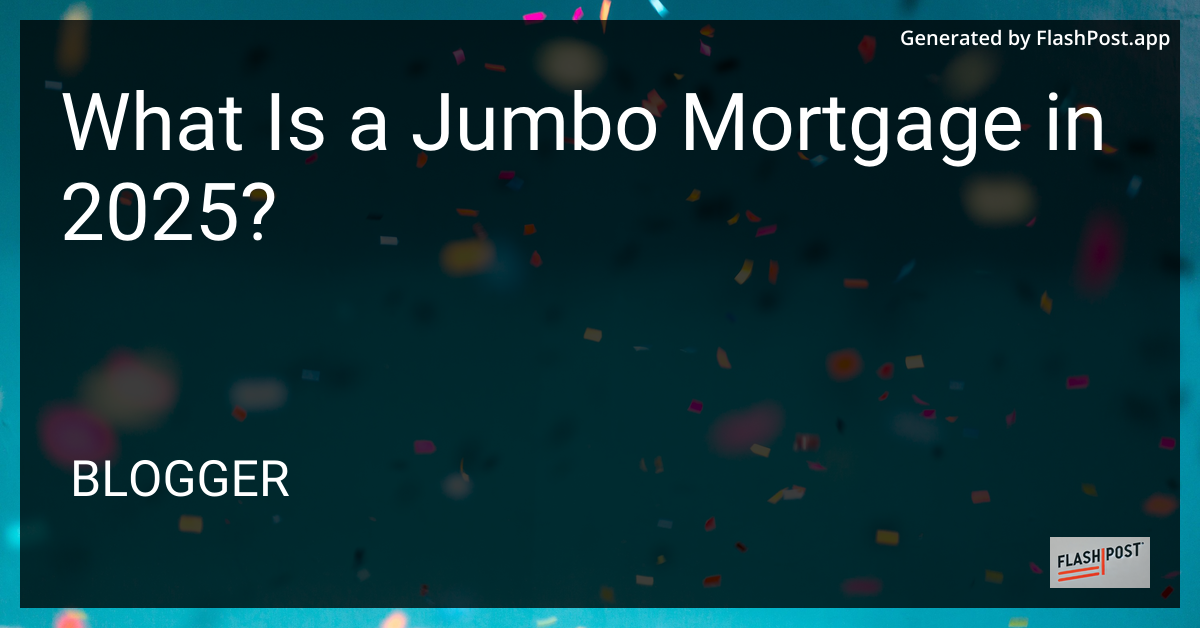What Is a Jumbo Mortgage in 2025?

What is a Jumbo Mortgage in 2025?
In the realm of real estate, understanding the intricacies of financing large purchases is crucial. One option available to homebuyers is the jumbo mortgage. As of 2025, navigating the world of jumbo mortgages requires a comprehensive understanding of their terms, benefits, and limitations. This article delves into what defines a jumbo mortgage, how it compares to conventional loans, and what potential borrowers should consider.
Understanding Jumbo Mortgages
A jumbo mortgage is a type of home loan that exceeds the conforming loan limits set by the Federal Housing Finance Agency (FHFA). These loans are not eligible to be bought, guaranteed, or securitized by Fannie Mae or Freddie Mac, the two government-sponsored enterprises that provide liquidity to the mortgage market. As a result, they are considered riskier and usually come with stricter underwriting requirements. For a deeper understanding of general mortgage concepts, visit our Understanding Mortgages page.
Conforming vs. Jumbo Loan Limits in 2025
In 2025, the conforming loan limit is projected to increase in many areas due to rising property values. However, any mortgage amount exceeding these limits is classified as a jumbo mortgage. The exact conforming limits can vary by region, especially in high-cost areas.
Key Characteristics of Jumbo Mortgages
Higher Loan Amounts: Jumbo mortgages are intended for properties that require financing beyond the conforming loan limits.
More Stringent Requirements: Due to the larger sums involved, lenders often impose stricter criteria such as higher credit scores, lower debt-to-income ratios, and larger down payments.
Interest Rates and Terms: Generally, interest rates on jumbo mortgages can be slightly higher than those on conforming loans, but competitive markets sometimes narrow this gap.
Advantages and Disadvantages
Advantages
Access to Luxury Homes: Jumbo loans enable the purchase of high-value real estate that otherwise couldn’t be funded through conventional means.
Flexible Terms: Some lenders offer customizable terms to suit the financial situation of their high-net-worth clients.
Disadvantages
Higher Down Payment: Buyers often need to put down between 10% to 30% of the property’s price, compared to lower down payments available for conventional loans.
Increased Risk: For both lenders and borrowers, a jumbo mortgage represents a higher financial commitment and risk.
Preparing for a Jumbo Mortgage
Prospective buyers should prepare by ensuring their credit score is in a stellar range and reducing their debt-to-income ratio. For those looking to finance through a jumbo mortgage, securing a mortgage pre-approval can streamline the buying process. Furthermore, understanding whether you can transfer a mortgage, perhaps to a family member in a state like Alabama, requires legal and financial consideration. More details can be found on family member mortgage transfer in Alabama.
Conclusion
In 2025, jumbo mortgages remain a vital instrument for acquiring high-value real estate. Although they come with more stringent borrowing terms and potential risks, with the right preparation, they offer a pathway to owning luxury properties. Buyers should carefully evaluate their financial situation and seek expert advice to optimize their mortgage strategy.
For future homeowners aiming to understand the intricacies of mortgage options or those already navigating the housing market, staying informed about jumbo loans is crucial to making well-informed real estate decisions.
Comments
Post a Comment